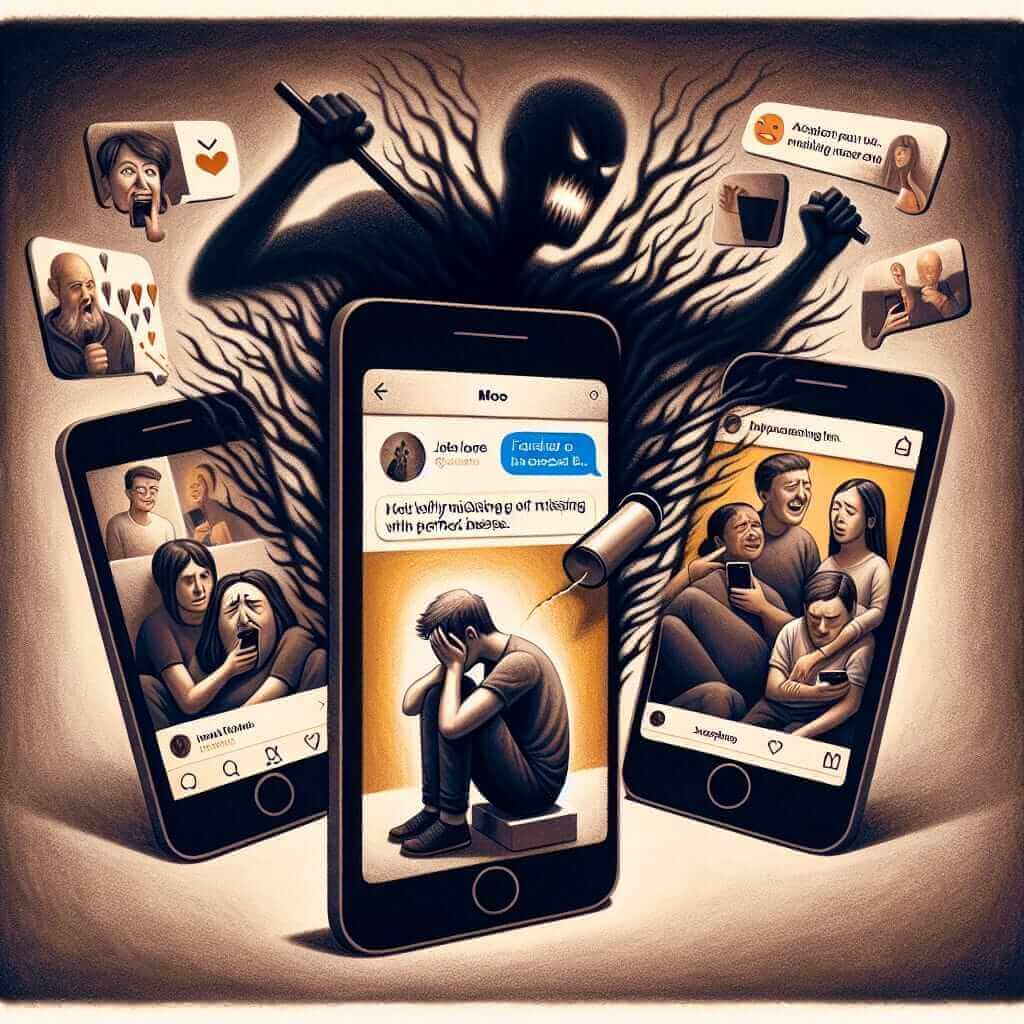The intersection of social media and mental health is a hot topic in today’s digitally driven world. It’s no surprise that this issue frequently appears in IELTS Writing Task 2, often with keywords like “social media,” “mental health,” “psychological well-being,” “online platforms,” and “cyberbullying.” Let’s look at some potential essay questions:
- To what extent do you agree that social media has a negative impact on the mental health of young people? Provide reasons for your answer and include any relevant examples from your own knowledge or experience. (This question type requires you to present a balanced view with your opinion clearly stated).
- Social media platforms are increasingly blamed for a rise in mental health issues. What are the causes of this problem, and what solutions can be suggested? (This question type asks for an analysis of causes and effects with proposed solutions).
- Some argue that the benefits of social media far outweigh its drawbacks, even considering its impact on mental health. Discuss both sides of this argument and give your own opinion. (This question requires you to discuss both sides of the issue before presenting your own viewpoint).
Dissecting the Question: A Sample Analysis
Let’s focus on the first question:
To what extent do you agree that social media has a negative impact on the mental health of young people? Provide reasons for your answer and include any relevant examples from your own knowledge or experience.
This question specifically targets:
- Target Group: Young people
- Focus: Negative impact of social media
- Task: Present a balanced view while stating your opinion
- Support: Provide reasons and examples
Crafting Your Response: A Model Essay
It is undeniable that social media has become ubiquitous amongst young people, permeating nearly every aspect of their lives. While these online platforms offer numerous benefits, their potential negative impact on mental health cannot be ignored. This essay will argue that social media, while not inherently detrimental, can significantly harm young people’s psychological well-being when used excessively or inappropriately.
One of the most significant drawbacks of social media is its potential to foster a culture of comparison and inadequacy. Young users are constantly bombarded with curated images and narratives that present an unrealistic and often unattainable standard of beauty, success, and happiness. This constant exposure can lead to feelings of inadequacy, low self-esteem, and even body image issues. For instance, studies have shown a correlation between increased social media use and higher rates of depression and anxiety among teenagers, particularly those who place a high value on peer approval and social validation.
Furthermore, cyberbullying, a pervasive issue on social media, can have devastating consequences for young people’s mental health. The anonymity and reach of online platforms provide bullies with a powerful tool to harass, humiliate, and ostracize their victims. Unlike traditional bullying, which often occurs within a defined physical space, cyberbullying can follow victims everywhere, leading to feelings of helplessness, anxiety, and social isolation. In extreme cases, cyberbullying has even been linked to suicidal thoughts and actions among young people.
However, it is important to acknowledge that social media can also have positive effects on mental health. It can provide a sense of community, connect individuals with shared interests, and offer platforms for self-expression and creativity. For some young people, particularly those who struggle with social anxiety or geographic isolation, online communities can provide a vital lifeline, offering a sense of belonging and support.
In conclusion, while social media offers certain benefits, its potential negative impact on young people’s mental health is undeniable. The culture of comparison, the prevalence of cyberbullying, and the addictive nature of these platforms can contribute to a range of psychological issues. It is crucial for young people to be mindful of their social media usage and to prioritize face-to-face interactions and real-world experiences. Moreover, parents, educators, and policymakers must collaborate to promote responsible social media use and mitigate its potential harms.

Word Count: 380 words
Key Writing Tips
- Formal Tone: Maintain a formal and academic tone throughout your essay.
- Clear Structure: Follow a clear essay structure with an introduction, body paragraphs, and a conclusion.
- Topic Sentences: Start each body paragraph with a clear topic sentence that outlines the main point.
- Supporting Evidence: Provide relevant examples and evidence to support your points.
- Transition Words: Use transition words and phrases to ensure a smooth flow between paragraphs.
Vocabulary Enhancers:
- Ubiquitous (adjective /juːˈbɪk.wɪ.təs/): Being or seeming to be everywhere at the same time.
- Permeate (verb /ˈpɜː.mi.eɪt/): To spread throughout something and be present in every part of it.
- Curated (adjective /kjʊəˈreɪ.tɪd/): Carefully chosen and presented, often referring to a collection of items or information.
- Inadequacy (noun /ɪˈnæd.ə.kwə.si/): The state of not being enough or good enough.
- Correlation (noun /ˌkɒr.əˈleɪ.ʃən/): A connection between two or more things, where one is affected by the other.
- Pervasive (adjective /pəˈveɪ.sɪv/): Present or noticeable in every part of a thing or place.
- Anonymity (noun /ˌæn.əˈnɪm.ə.ti/): The state of being anonymous, or not having one’s name or identity known.
- Ostracize (verb /ˈɒs.trə.saɪz/): To exclude someone from a group or society.
- Mitigate (verb /ˈmɪt.ɪ.ɡeɪt/): To make something less harmful, unpleasant, or bad.
- Detrimental (adjective /ˌdet.rɪˈmen.təl/): Causing harm or damage.
Further Exploration:
This is just one example of how to approach an IELTS Writing Task 2 essay on the impact of social media on mental health. To further enhance your preparation, explore related subtopics such as:
- The role of social media in body image issues
- The impact of social media on sleep quality
- The addictive nature of social media and its consequences
- Strategies for promoting responsible social media use among young people
- The future of social media and its potential impact on mental well-being